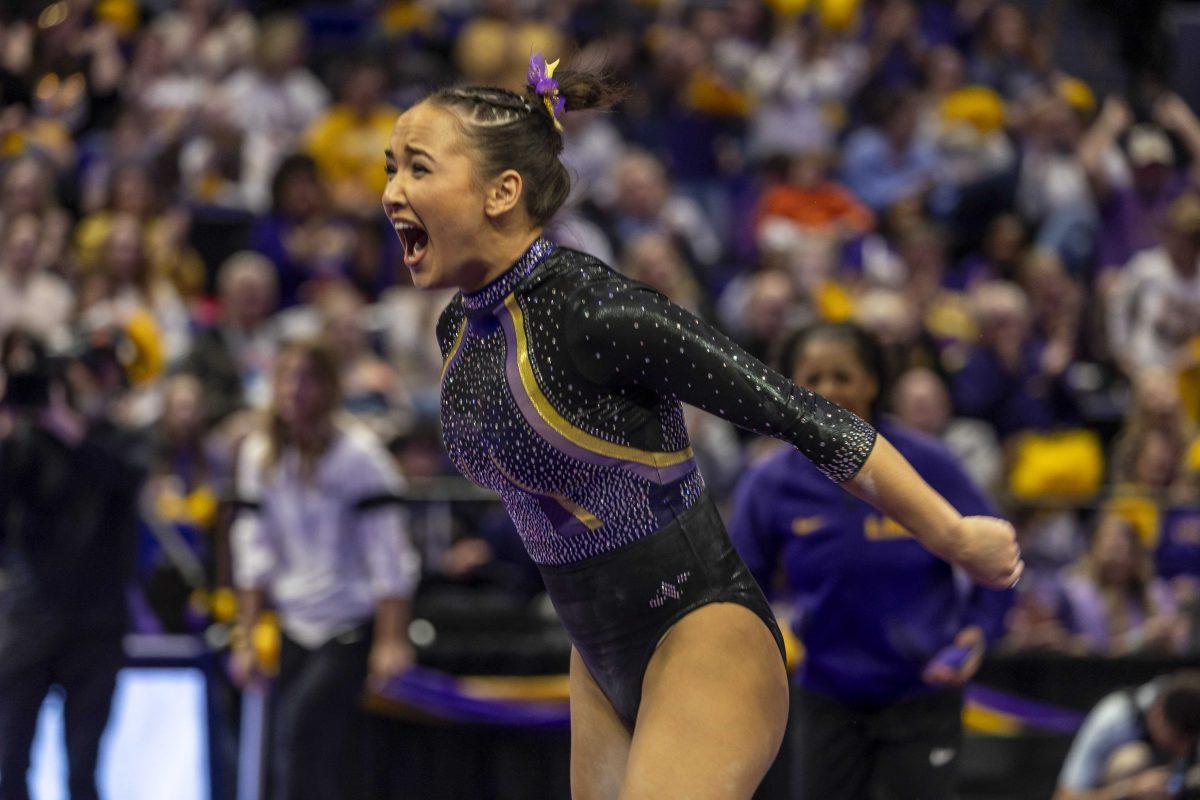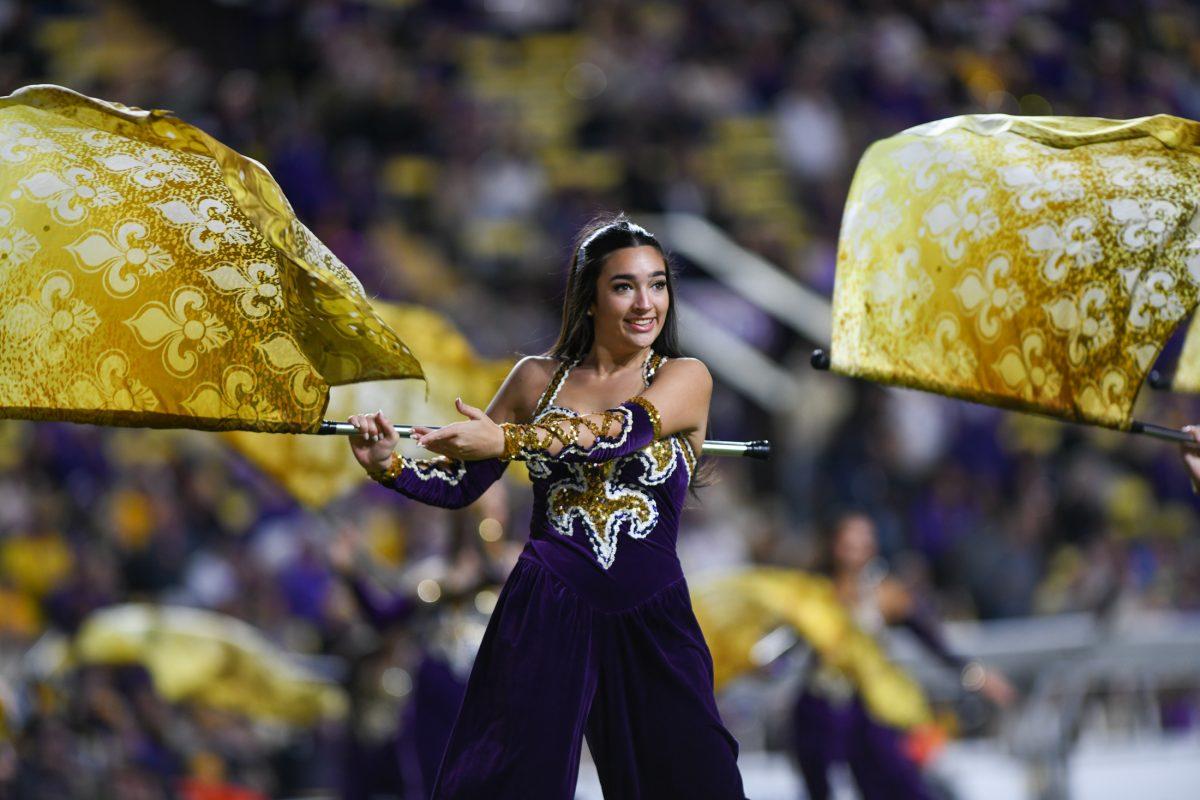It seems like it was just yesterday. The memory is still fresh in the mind of LSU football fans everywhere.
It was the fall of 2003, and No. 11 LSU was hosting No. 7 Georgia in an epic Southeastern Conference football matchup.
The first half was a defensive struggle, with Georgia leading 3-0 late in the second quarter. Then, LSU sophomore running back Shyrone Carey broke free.
Carey took the handoff from quarterback Matt Mauck up the middle, juked a couple helpless Bulldogs and plunged head-first into the end zone for a 21-yard score.
The Tigers took a 7-3 lead on Carey’s run. They went on to win the game 17-10 and at the end of the season were crowned the Bowl Championship Series National Champion.
But just before the beginning of Carey’s senior season at LSU in 2005, the New Orleans area was hit with the most devastating natural disaster the area has ever seen — Hurricane Katrina.
Katrina demolished everything in its path and left Carey’s hometown of New Orleans in tatters.
One school particularly hard hit by the storm was George Washington Carver High School.
Following Katrina the historically powerful Carver Rams football program was forced to shut down operations.
The Rams restarted their program in 2008, but they still needed a coach. The man who showed the most interest in running the program was none other than Carey.
“Shyrone came when he heard we were looking at starting up a football program,” said Carver Athletic Director Brian Bordainick. “He wanted to come and wanted the job.”
Bordainick said the school had a handful of candidates for the job, but Carey was head and shoulders above the competition.
“He was one of the few people who really stepped up to take the job,” Bordainick said. “He just really stepped up and showed interest.”
The reason so few people showed interest in the Carver job was the program was rebuilding from scratch. The team was forced to practice and play on an abandoned lot next to the school and it had minimal equipment.
“In order to run our athletic program the first year we relied heavily on donations,” Bordainick said. “The kids went to schools in trailers, their baseball and footballs were what other people didn’t want. It sent a message that the kids weren’t as good as someone that went to school up the street.”
Even the coaches had to pitch in their own money to give the players the bare necessities.
“Financially we were writing checks and worried about them bouncing,” Bordainick said. “Our football coaches were even buying stuff on their credit cards.”
The 2008 Carver squad had just 30 players and finished the season winless. Carey — who along with winning the national title at LSU also led Archbishop Shaw High School to a Louisiana state championship game in 1997 — was not accustomed to losing.
“He’s used to winning,” said Carver wide receivers coach Denard Johnson. “He doesn’t accept second best, and he doesn’t accept anything less than 110 percent. And he expects that out of both his coaches and his players.”
Carey’s coaching prowess began to shine through in the team’s second season in 2009. The Rams finished the regular season 5-5 and ranked No. 32 in Class 3A, good enough to advance to the state playoffs.
“We were picked to go 0-10 again,” Johnson said. “In fact, we were picked last in our district, and before you knew it we were threatening to win the district.”
But part of the reason for the struggles in Carey’s first season was the fact that most of the players on the team had been out of football since before the storm.
“Practically 90 percent of our kids had not played football since Katrina,” Johnson said. “And I had to say ‘You have to give it time Shy,’ because he was so used to winning. This season we turned it completely around.”
Carey’s coaching style much resembles that of his head coach at LSU, Nick Saban. He describes himself as a hard-nosed coach.
“I’m kind of like a tough coach,” Carey said. “I try to develop a relationship with them off the field so they know that when they do stuff on the field it’s game time and it’s time to put in the work and practice. Every coach that I ever had was very intense, so that’s how I try to be.”
Johnson said Carey is strict on the field, but once he is away from football his persona is the polar opposite.
“He’s two totally different people,” Johnson said. “He’s easy going, he’s the kind of guy you wouldn’t mind having a drink with. He’s like a General Patton on the field, but off the field he’s like a ball of cotton.”
Carey’s accomplishments haven’t gone unnoticed by Saban, now in charge at Alabama.
“He was obviously an outstanding football player, but the thing I’m most proud of is all that he overcame to be able to be in the position that he is in today,” Saban said. “To graduate from school, he wanted to help others, he wanted to give back to the community, he wanted to go back where he came from where he had it difficult and tough.”
Carey’s mentality as a coach does not surprise Hank Tierney, Carey’s head coach at Shaw and current offensive coordinator at Ponchatoula High School.
“I’m not surprised he’s coaching because he was a student of the game,” Tierney said. “But everything he did, he was a go-getter. He was a tough-minded guy, but we still stay in touch.”
But there is much more to Carey’s job as Carver’s head football coach then simply blowing the whistle at practice.
Carver is still without a football stadium to call home. But behind the efforts of Bordainick, a 24-year old University of Georgia graduate who landed at Carver through the Teach for America program, Carver started a project called the 9th Ward Field of Dreams.
The challenge Bordainick set for the Field of Dreams project was to raise $1.85 million to build a football and Olympic track stadium for the public schools in the 9th Ward area.
Bordainick started the project in the fall of 2008 when he heard about a matching grant available through the NFL Grassroots program. The program would match any grant up to $200,000.
“I figured, ‘Why not?'” Bordainick said. “Worst comes to worst, if we raise a couple thousand dollars, we can apply for a couple thousand dollars and we’ll get a couple thousand dollars more than we had initially, and that’s a win for everybody involved.”
The project exploded from there. Carver raised $1,400 in the first day alone. Students were bringing in cash and checks; they were knocking on neighbor’s doors and calling local businessmen. Even Nike pitched in, initially donating $100,000.
Carver received the full $200,000 grant from the NFL, and the 9th Ward Field of Dreams dream was starting to become a reality.
“Things just started to happen and fall into place,” Bordainick said.
As time passed, local sports stars began to get involved. New Orleans Saints quarterback Drew Brees and Marshall Faulk, former NFL All-Pro and Carver alumnus, teamed up in an effort to raise $800,000 for the Field of Dreams.
Currently, the 9th Ward Field of Dreams has raised more than $1.2 million of the $1.85 million goal.
Bordainick hopes the completion of the field will be something of which the kids of the area can be proud.
“The biggest misconception about inner-city areas is that people don’t really care,” Bordainick said. “I think that is just not true. It’s just a lack of facilities and resources that’s really hindered the development of youth sports here.”
And Carey’s impact on the Field of Dreams cannot be understated.
“By him being the kind of player he was at Shaw and then going on to LSU, a lot of people know him,” Johnson said. “At George Washington Carver we have a real rich history when it comes to football. That coupled with Shyrone’s notoriety, it has had a serious, serious impact on the Field of Dreams.”
Carey wants his impact on the Field of Dreams to help not just the kids that will play in the stadium, but the whole area.
“Being a part of the Field of Dreams project, to bring a field to Carver and to the 9th Ward area is just a great opportunity and a great time for me and for Carver and for all the people that represent the 9th Ward in a good light,” Carey said.
But most of all, Carey hopes he can set an example for all his players to look up to.
“I’m just trying to make a positive impact on all these kids’ lives,” Carey said. “We deal with a lot of kids that don’t have father figures. So for me, I take great satisfaction in helping some of these kids direct their lives in the right way so they can make better decisions and have long term success by the decisions that they make.”
——Contact Rob Landry at rlandry@lsureveille.com
Former LSU running back Shyrone Carey leads the way in rebuilding Carver High School football
March 1, 2010





